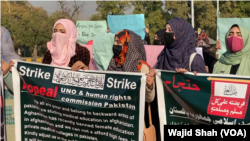The Afghan Taliban’s ban on women attending universities has been devastating for foreign students who had been studying medicine in Afghanistan.
Last week, 105 female students at Afghan universities — all of whom are from Pakistan’s western Khyber-Pakhtunkhwa province bordering Afghanistan — staged a protest in Pakistan’s capital, Islamabad, appealing for international help.
The demonstrators Tuesday pleaded with the United Nations for help and asked the Pakistani government to provide special scholarships for students in public sector medical colleges.
“We went to the United Nations organization in Islamabad, we appealed to them to arrange scholarships for us. We are 105 students; we are requesting them to provide us with the opportunity to continue our education,” said Sana Gul, a third-year medicine student from a private university in the eastern Afghan city Nangarhar.
Kali Akbar, a female student who was preparing for her last exam when the ban was announced, says the Taliban’s restriction has been crushing on a personal level.
“More than 20 female students that I know are dealing with depression and anxiety. They are currently under medical treatment," she said. "For a student, it is a very tough situation to deal with.”
Spogmai Gul, another student from a private university in Nangarhar province, recalled waking up to the news that female students had been banned from private and public universities in Afghanistan. She said finishing school and getting her medical degree were her only dreams.
“For the last three years we were studying medical in Afghanistan. We went through a lot of struggles; we paid private university fees. Everything will be wasted if we are not given a chance. We are calling on Pakistani government and the world to help us and provide us special scholarships,” Gul said.
The Taliban have defended the restrictions on women and other hardline policies as based on Islamic jurisprudence. Many majority Muslim countries and Islamic scholars have rejected that reasoning.
There are signs that the Taliban’s radical ideology and hardline policies are having a broader cultural impact in the region. Syed Irfan Ashraf, assistant professor in the department of journalism at the University of Peshawar in Pakistan, said the Taliban’s ban on women’s education and increased restrictions on how women dress have affected attitudes in Pakistan.
“The Taliban brought an extremist ideology in Afghanistan with their power, which has affected all the border areas from Baluchistan to Khyber Pakhtunkhwa,” he said.
“This is bringing change in youth’s behavior in Pakistan because Taliban claim they have defeated United States in the region and say they are ready to defeat other non-believers. So, this has created an ideological encouragement for people in Pakistan.”
The Taliban have imposed wide-ranging restrictions on women since returning to power in August 2021. The Islamist group has closed girls’ secondary schools and universities, banned women from public parks, gyms, and baths, imposed mandatory face coverings for women, restricted work and imposed executions and harsh public punishments such as flogging.
No government has recognized the Taliban’s administration, mainly over human rights concerns and the treatment of Afghan women.
This story originated in VOA’s Deewa service.





